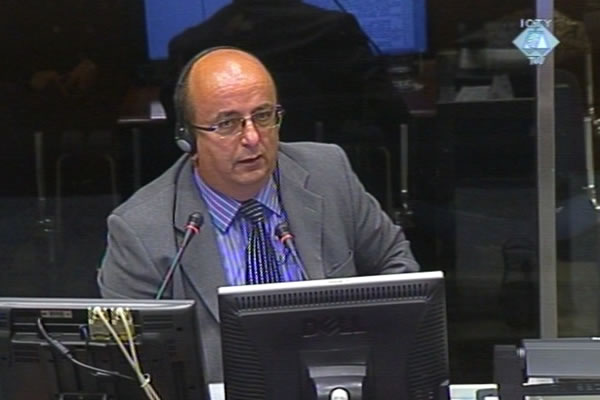Home
IVAN CERMAK WAS ‘A MULTIDIMENSIONAL PERSON’
According to witness Borislav Skegro, President Tudjman sent Cermak to Knin as a ‘multidimensional person’, to deal with civilian and not military affairs. The prosecution tried to refute this by contesting Skegro’s credibility, implying that during his term of office in the Croatian government Skegro lied, threatened journalists and opposed co-existence
 Borislav Škegro, svjedok odbrane Ivana Čermaka
Borislav Škegro, svjedok odbrane Ivana Čermaka In 1993, when Ivan Cermak was briefly appointed minister of industry, his defense witness Borislav Skegro began his five-year mandate as the deputy prime minister of the Croatian government in charge of economy. Two years later, in August 1995 Cermak and Skegro ‘met once more’ as top officials when Cermak was appointed commander of the Knin Garrison. According to the indictment against him, Cermak, as the garrison commander, was responsible for the crimes committed after Operation Storm, together with generals Ante Gotovina and Mladen Markac.
In the statement he gave to Cermak’s defense, a summary of which was read by defense counsel Kay in court today, Skegro said that after the Croatian Army entered Knin President Tudjman decided to send down a ‘multidimensional person’, someone able to start up the economy, help civilians, cooperate with the UN mission and normalize the conditions in the town. This person was supposed to facilitate the return of the Croats who had fled the region in 1991 and also of the Serbs who had abandoned their homes during Operation Storm.
One day after the liberation, on 6 August 1995, the witness visited Knin. On 26 August Skegro was in Knin for the second time together with President Tudjman and other politicians. Finally, on 7 September, Skegro attended the session of the Croatian government held on that day in Knin. On his way back to Zagreb after the last visit the witness saw houses on fire and dead cattle by the side of the road. As the witness put it, he and prime minister Nikica Valentic ‘asked who may have perpetrated the crime’. It was a ‘personal vendetta’ and not part of a plan to expel Serbs, the witness concluded. Skegro contends that peace and order in the Krajina territory were under the sole jurisdiction of the civilian police and interior minister Jarnjak.
In his cross-examination, the prosecutor focused more on the credibility of the witness than on what he had said in his statement. The prosecutor first showed the transcript of a meeting in April 1995 where Skegro admits he lied before the Parliament. According to the transcript, Skegro would ‘lie to the Pope himself for the good of Croatia if need be’. Asked why anyone should believe that he was not lying before the Tribunal, the witness said that he had mentioned the Pope only as a ‘figure of speech’, in an effort to cover up the fact that the money from the budget had been spent to import weapons instead of stabilizing the market.
The prosecution went on to quote from the transcript of another meeting with Tudjman where Skegro says there could be no co-existence in BH because ‘those that do not belong together cannot live together’. As far as BH is concerned, Skegro said today, he ‘was right’ but it would never occur to him to speak about the co-existence of Serbs and Croats in Krajina in those terms. The prosecution then showed him articles published in the Croatian media where Skegro in 1996 made death threats against a journalist; in fact, he drew a gun at her. Skegro said he had been tried for the incident and the judgment found that none of the allegations were true.
As Skegro’s evidence drew to its close, the presiding judge Orie asked him some questions. He wanted to know if the witness knew about the incident in the village of Grubori where five elderly Serbs were killed in late August 1995. Contrary to the defense claims that Croatian officials were of the opinion that the victims were caught in the cross-fire between the special troops and the remaining Serb soldiers, Skegro said that some days after the incident the government bodies discussed the crime in which the old people had been killed in their homes. Gotovina’s defense counsel Kehoe noted that the witness ‘may have mixed up’ the Grubori incident with a similar crime against Serb civilians in the village of Varivode. Skegro then repeatedly said he could hardly remember those events today.
Linked Reports
- Case : Gotovina et al. - "Operation Storm"
- 2009-09-28 CIVIL COMMANDER IN A MILITARY UNIFORM
- 2009-09-25 WHO BOUGHT DOCUMENTS ON THE BLACK MARKET?
- 2009-09-24 GENERAL CERMAK’S ‘INFORMATIVE ORDERS’
- 2009-09-30 INEFFECTIVE ORDERS TO IMPROVE EFFECTIVENESS
- 2009-10-01 GENERAL WITH CIVILIAN POWERS
- 2009-10-05 CERMAK ‘MIXED UP INFORMATION’ ABOUT THE GRUBORI CRIME
